高中英语倒装句讲解课件(共24张PPT)
文档属性
| 名称 | 高中英语倒装句讲解课件(共24张PPT) | 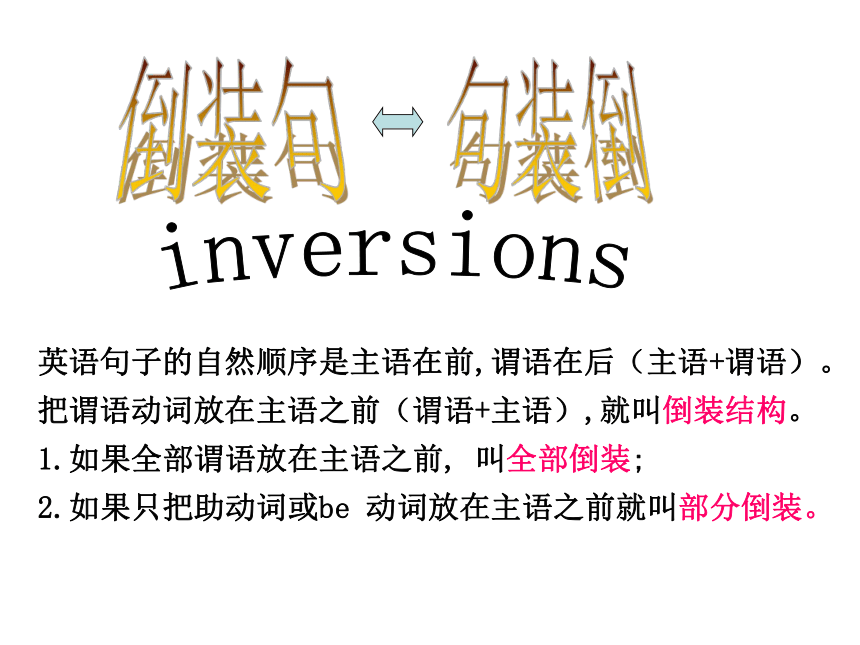 | |
| 格式 | zip | ||
| 文件大小 | 235.0KB | ||
| 资源类型 | 教案 | ||
| 版本资源 | 通用版 | ||
| 科目 | 英语 | ||
| 更新时间 | 2020-07-15 10:11:45 | ||
图片预览

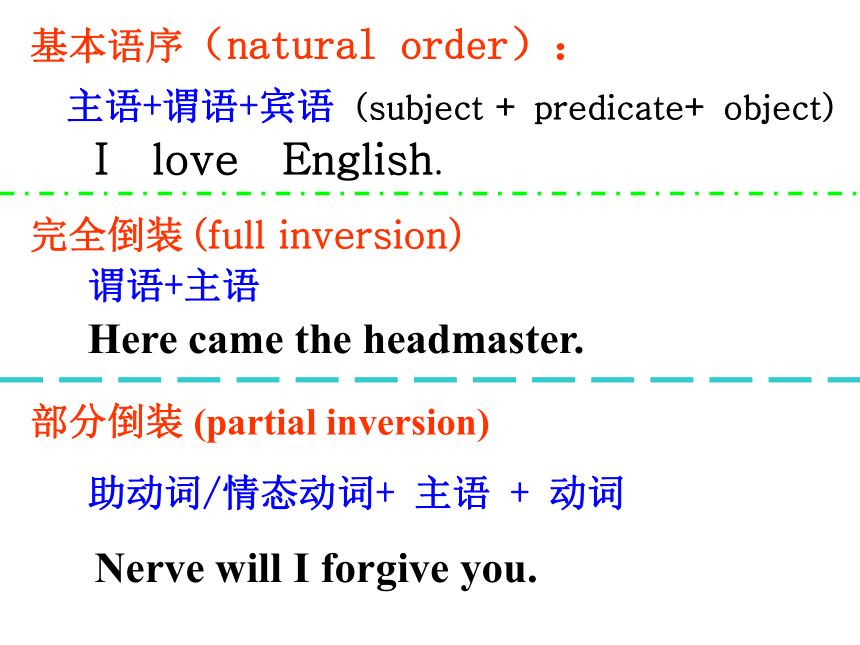
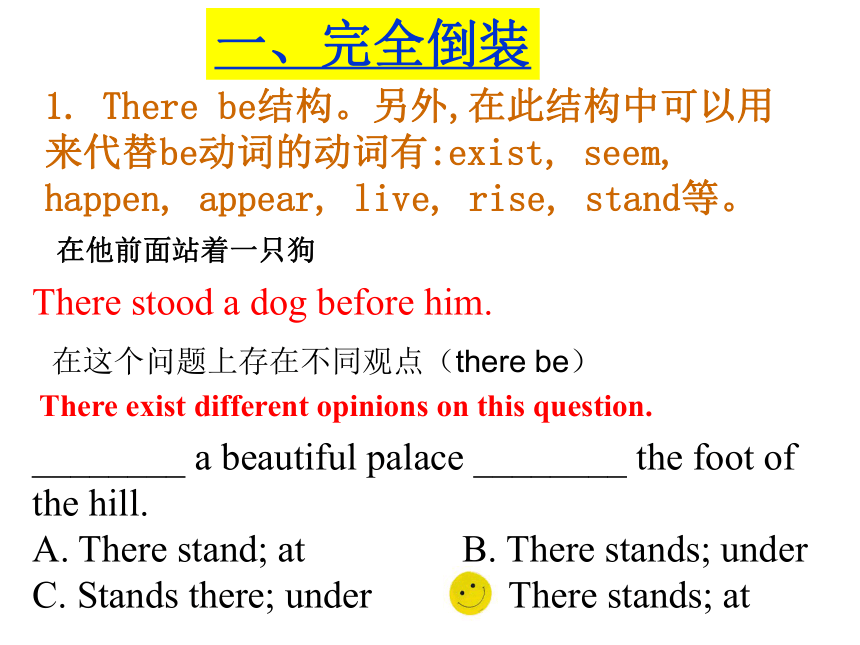
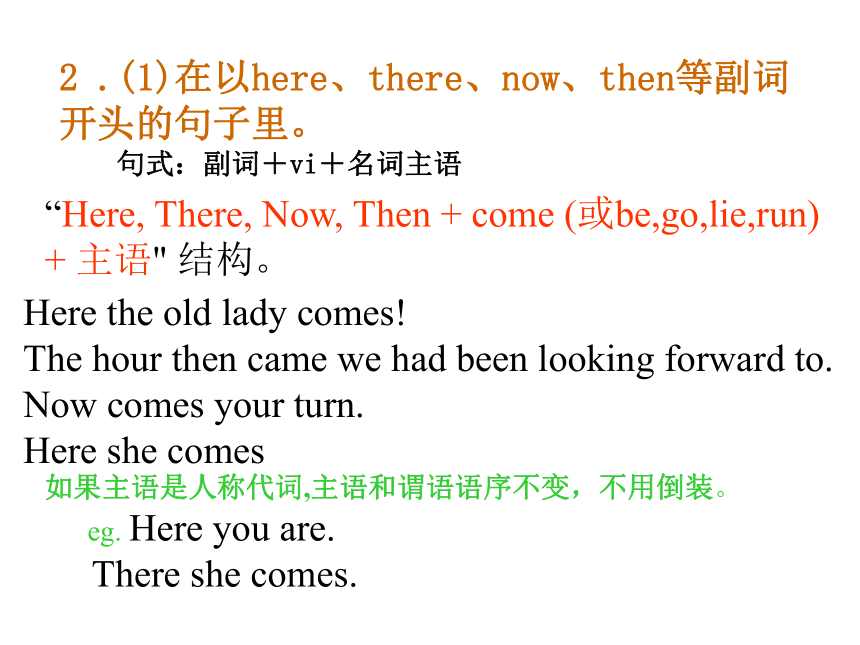
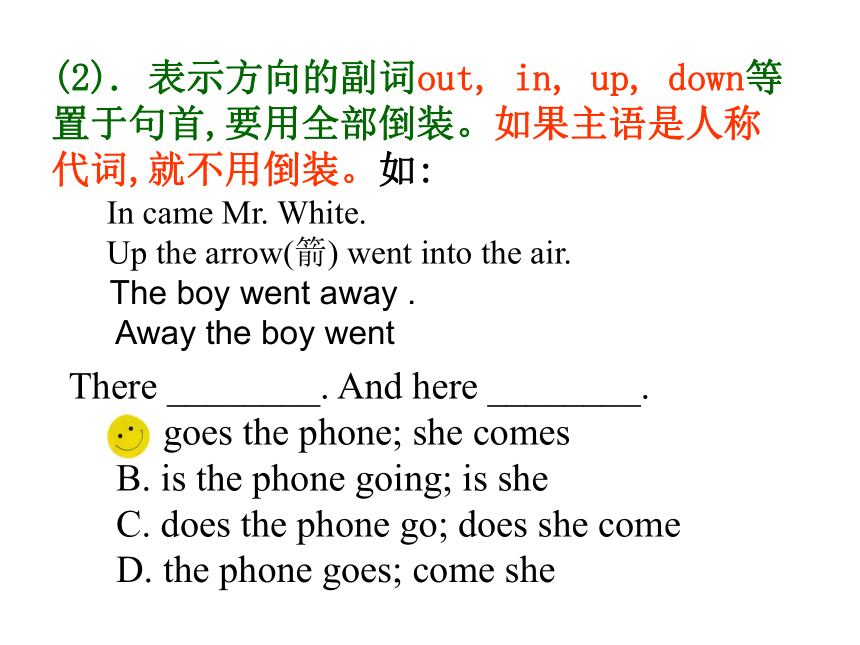
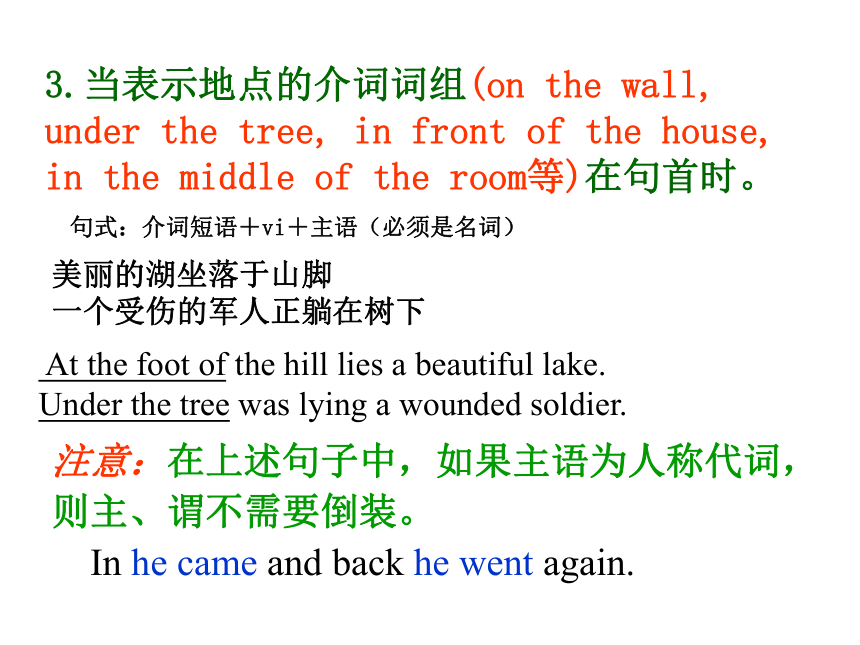
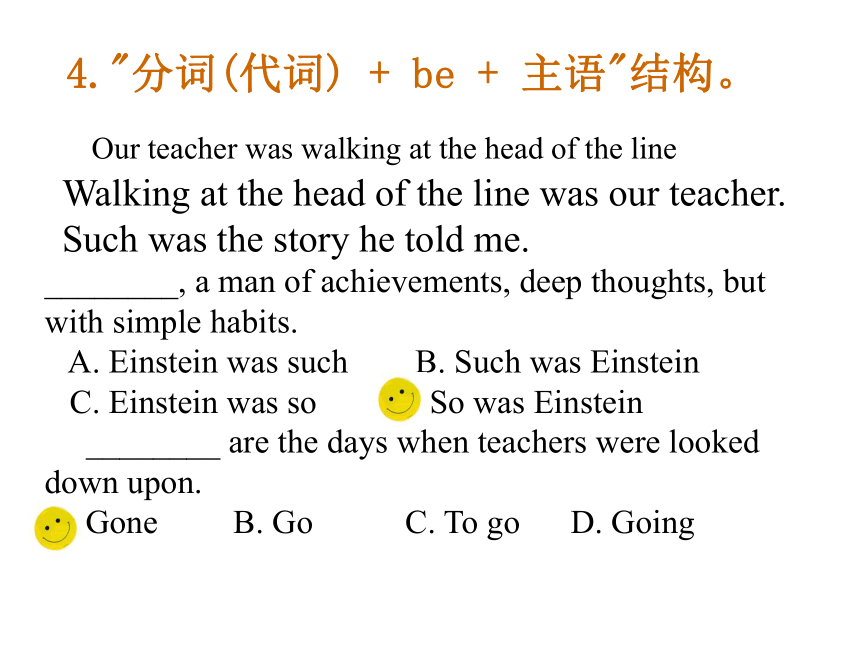
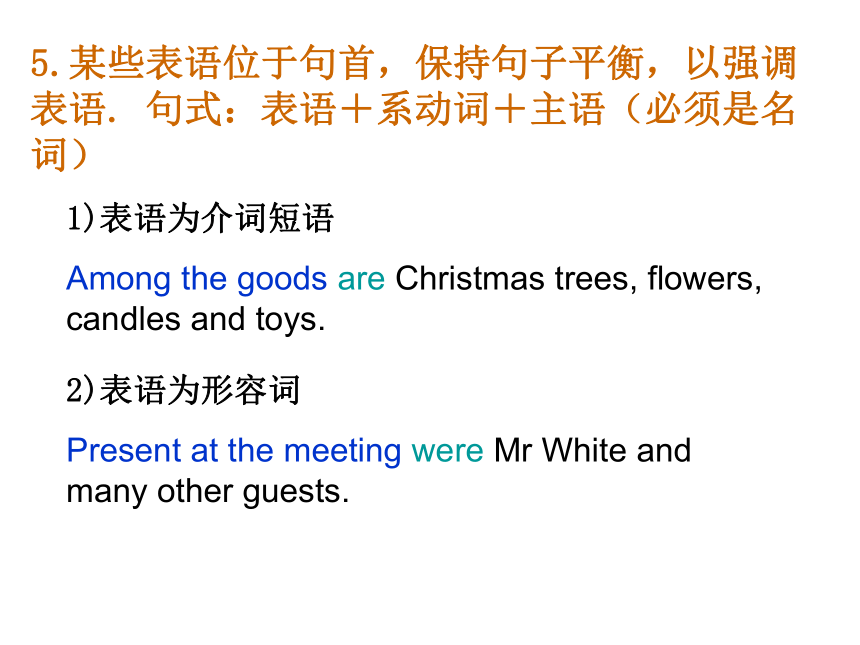
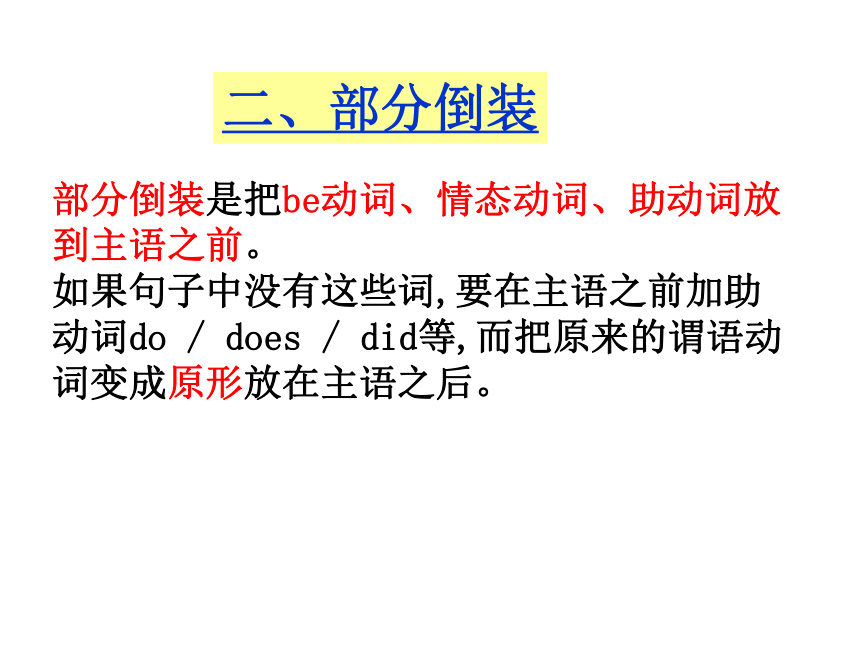
文档简介
(共24张PPT)
英语句子的自然顺序是主语在前,谓语在后(主语+谓语)。
把谓语动词放在主语之前(谓语+主语),就叫倒装结构。
1.如果全部谓语放在主语之前,
叫全部倒装;
2.如果只把助动词或be
动词放在主语之前就叫部分倒装。
倒装句
句装倒
inversions
基本语序(natural
order):
主语+谓语+宾语(subject
+
predicate+
object)
I
love
English.
谓语+主语
完全倒装
(full
inversion)
Here
came
the
headmaster.
助动词/情态动词+
主语
+
动词
部分倒装
(partial
inversion)
Nerve
will
I
forgive
you.
一、完全倒装
1.
There
be结构。另外,在此结构中可以用来代替be动词的动词有:exist,
seem,
happen,
appear,
live,
rise,
stand等。
There
stood
a
dog
before
him.
________
a
beautiful
palace
________
the
foot
of
the
hill.
A.
There
stand;
at
B.
There
stands;
under
C.
Stands
there;
under
D.
There
stands;
at
在他前面站着一只狗
在这个问题上存在不同观点(there
be)
There
exist
different
opinions
on
this
question.
2
.(1)在以here、there、now、then等副词开头的句子里。
句式:副词+vi+名词主语
“Here,
There,
Now,
Then
+
come
(或be,go,lie,run)
+
主语"
结构。
Here
the
old
lady
comes!
The
hour
then
came
we
had
been
looking
forward
to.
Now
comes
your
turn.
Here
she
comes
如果主语是人称代词,主语和谓语语序不变,不用倒装。
eg.
Here
you
are.
There
she
comes.
(2).
表示方向的副词out,
in,
up,
down等置于句首,要用全部倒装。如果主语是人称代词,就不用倒装。如:
In
came
Mr.
White.
Up
the
arrow(箭)
went
into
the
air.
The
boy
went
away
.
Away
the
boy
went
There
________.
And
here
________.
A.
goes
the
phone;
she
comes
B.
is
the
phone
going;
is
she
C.
does
the
phone
go;
does
she
come
D.
the
phone
goes;
come
she
注意:在上述句子中,如果主语为人称代词,则主、谓不需要倒装。
???
In
he
came
and
back
he
went
again.
3.当表示地点的介词词组(on
the
wall,
under
the
tree,
in
front
of
the
house,
in
the
middle
of
the
room等)在句首时。
句式:介词短语+vi+主语(必须是名词)
At
the
foot
of
the
hill
lies
a
beautiful
lake.
Under
the
tree
was
lying
a
wounded
soldier.
美丽的湖坐落于山脚
一个受伤的军人正躺在树下
4."分词(代词)
+
be
+
主语"结构。
Walking
at
the
head
of
the
line
was
our
teacher.
Such
was
the
story
he
told
me.
________,
a
man
of
achievements,
deep
thoughts,
but
with
simple
habits.
A.
Einstein
was
such
B.
Such
was
Einstein
C.
Einstein
was
so
D.
So
was
Einstein
________
are
the
days
when
teachers
were
looked
down
upon.
A.
Gone
B.
Go
C.
To
go
D.
Going
Our
teacher
was
walking
at
the
head
of
the
line
5.某些表语位于句首,保持句子平衡,以强调表语.
句式:表语+系动词+主语(必须是名词)
1)表语为介词短语
Among
the
goods
are
Christmas
trees,
flowers,
candles
and
toys.
2)表语为形容词
Present
at
the
meeting
were
Mr
White
and
many
other
guests.
二、部分倒装
部分倒装是把be动词、情态动词、助动词放到主语之前。
如果句子中没有这些词,要在主语之前加助动词do
/
does
/
did等,而把原来的谓语动词变成原形放在主语之后。
1.
句首状语为否定词或半否定词的句子。
这类词或短语主要有never,
neither,
nor,
little,
seldom(很少,不常),
rarely(很少,罕有),
hardly,
scarcely(几乎不,简直没有),
no
sooner(立即),
by
no
means(决不)
,not
only,
in
no
way(决不),
at
no
time,
few,
not,
no等,
句式:
“否定词/词组+助动词/情态动词/be动词+主语+其他”。
a.Not
until+从句/时间状语+主句(部分倒装)。
b.No
sooner
had
sb
done
than…;
c.Hardly/scarcely
had
sb
done
when…
刚刚…就
d.Not
only+分句(部分倒装)but
also+分句(不倒装)
Not
simply
did
he
teach
school,
but
also
he
wrote
novels
他不仅教书,也写小说
1)
Hardly
____
the
airport
when
the
plane
took
off.
A.
I
had
arrived
at
B.
had
I
arrived
C.
had
I
reached
D.
I
had
got
to
2)
—Have
you
ever
seen
anything
like
that
before?
—No,
_____
anything
like
that
before.
A.
I
never
have
seen
B.
never
I
have
seen
C.
never
have
I
seen
D.
I
have
seen
3)
She
is
not
fond
of
cooking,
____
I.
A.
so
am B.
nor
am C.
neither D.
nor
do
2.
Only
+
状语(副词/
介词短语/
状语从句),位于句首
,要部分倒装。
Only
by
this
means
is
it
possible
to
explain
it.
Only
then
did
I
realize
the
importance
of
math.
Only
when
the
war
was
over
in
1918
he
was
able
to
get
happily
back
to
work.
Only
he
is
able
to
speak
English
fluently
注意:①
在only+状语从句+主句结构中,主句倒装,
但从句用正常语序。
②only修饰主语,不倒装。
只有通过这种方式才有可能来解释它
只有那个时候,我才意识到数学的重要性
3.
so或so引导的短语放在句首,前半部分倒装。
I
saw
the
film,
so
did
she.
So
loudly
did
he
speak
that
even
people
in
the
next
room
could
hear
him.
1)
The
doctor
told
Charlie
to
breathe
deeply
and
____.
A.
so
did
Charlie
B.
Charlie
did
so
C.
Charlie
does
so
D.
did
Charlie
so
2)
So
loudly
_____
that
____
hear
her
clearly.
A.
did
she
speak;
could
everyone
B.
did
she
speak;
everyone
could
C.
she
spoke;
could
everyone
D.
she
spoke;
everyone
could
4、as/
though
(虽然,尽管)引导的让步状语从句。
句式:名词\形容词\副词\动词\分词+as\though+主语+其他
Although
I
am
ugly,
I
am
gentle.
Ugly
as
I
am,
I
am
gentle.
Though
he
is
a
child,
he
has
to
make
a
living.
Child
as
he
is,
he
has
to
make
a
living.
6.用于So/neither
(nor)
+
be
(
have,
助动词或情态动词)
+
主语+其他的句子
He
has
been
to
Beijing.
So
have
I.
Tom
can’t
answer
the
question.
Neither
/Nor
can
I
.
So
+be/助动词/情态动词+主语
某人也是如此
Nor/neither
+be/助动词/情态动词+主语
某人也不是如此
So
+主语+be/助动词/情态动词
某人确实如此
-I
have
never
been
to
Guangzhou
University,
-neither/
nor
has
he.
我从来没有去过广州大学,他也是.
表示两人的同样一个情况时,只能表示一件事,
即上、下句所使用的动词、时态要一致。
否则要用so
it
is
with…/It
is
the
same
with…
7.在虚拟语气条件句中从句谓语动词有were,
had,
should等词,可将if
省略,把
were,
had,
should
移到主语之前,采取部分倒装。
(1)If
I
were
you,
I
would
work
hard.
(2)
If
it
should
rain
tomorrow,
we
would
put
off
our
meeting.
注意:我们可以说Were
it
not...或者Had
it
not
been...,
但不可以说Weren’
t
it...
或者hadn’t
it
been...
Were
I
you,
I
would
work
hard.
Should
it
rain
tomorrow,
we
would
put
off
our
meeting
8.句首是表频率的副词及短语(often,
well,
many
a
time,
now
and
again,,
once
a
week,
now
and
then,
every
other
day等)
开头的句子中,要用部分倒装结构。
如:
Many
a
time
has
John
given
me
good
advice.
Often
have
we
made
that
test.
Many
a
time
________
swimming
alone.
A.
the
boy
went
B.
went
the
boy
C.
did
the
boy
go
D.
did
go
the
boy
9,在某些表示祝愿的句型中
如:May
you
all
be
happy.
Long
live
China!
巧记倒装句
在带有倒装句的复合句(或并列句)中,到底应在何处倒装,下面的顺口溜可以帮助你较容易地掌握其结构形式。
NB前倒后不①,??????????????????????????
O,NU主倒从不倒②,
2N前倒后也倒③,?????????????????????
NM前后均不倒④。
①NB代表Not
only…,but
also…引导的并列句。
not
only位于句首时,所引导的前面的分句倒装,后面的分句不倒装。故此称为“前倒后不倒”。
如:1)Not
only
did
he
come,but
also
he
was
very
happy.
2)Not
only
was
everything
that
he
had
taken
away
from
him
,but
also
his
German
citizenship(was
taken
away).
②O代表only+状语从句;NU代表Not
until+状语从句。此两种结构位于句首时,倒装主句而不倒装从句,即:“主倒从不倒”。
如:1)Only
when
he
told
me
did
I
know
it.
2)Not
until
I
began
to
work
did
I
realize
how
much
time
I
had
wasted.
No
sooner…than…,Hardly
Scarcely…when…等句型也属此类用法。
如:No
sooner(Hardly)
had
we
reached
home
than(when)it
began
to
rain.
③2N代表Neither…nor…所引导的并列句。2N若位于两分句之首,则前后分句均倒装。即“前倒后也倒”。
如:Neither
do
I
know
her
name,nor
does
he.
④NM即No
matter…引导的状语从句。此时前面从句及后面主句均不倒装。即“前后均不倒”。
如:No
matter
how
busy
he
is,he
always
comes
to
help
us.
Bye--bye
!
英语句子的自然顺序是主语在前,谓语在后(主语+谓语)。
把谓语动词放在主语之前(谓语+主语),就叫倒装结构。
1.如果全部谓语放在主语之前,
叫全部倒装;
2.如果只把助动词或be
动词放在主语之前就叫部分倒装。
倒装句
句装倒
inversions
基本语序(natural
order):
主语+谓语+宾语(subject
+
predicate+
object)
I
love
English.
谓语+主语
完全倒装
(full
inversion)
Here
came
the
headmaster.
助动词/情态动词+
主语
+
动词
部分倒装
(partial
inversion)
Nerve
will
I
forgive
you.
一、完全倒装
1.
There
be结构。另外,在此结构中可以用来代替be动词的动词有:exist,
seem,
happen,
appear,
live,
rise,
stand等。
There
stood
a
dog
before
him.
________
a
beautiful
palace
________
the
foot
of
the
hill.
A.
There
stand;
at
B.
There
stands;
under
C.
Stands
there;
under
D.
There
stands;
at
在他前面站着一只狗
在这个问题上存在不同观点(there
be)
There
exist
different
opinions
on
this
question.
2
.(1)在以here、there、now、then等副词开头的句子里。
句式:副词+vi+名词主语
“Here,
There,
Now,
Then
+
come
(或be,go,lie,run)
+
主语"
结构。
Here
the
old
lady
comes!
The
hour
then
came
we
had
been
looking
forward
to.
Now
comes
your
turn.
Here
she
comes
如果主语是人称代词,主语和谓语语序不变,不用倒装。
eg.
Here
you
are.
There
she
comes.
(2).
表示方向的副词out,
in,
up,
down等置于句首,要用全部倒装。如果主语是人称代词,就不用倒装。如:
In
came
Mr.
White.
Up
the
arrow(箭)
went
into
the
air.
The
boy
went
away
.
Away
the
boy
went
There
________.
And
here
________.
A.
goes
the
phone;
she
comes
B.
is
the
phone
going;
is
she
C.
does
the
phone
go;
does
she
come
D.
the
phone
goes;
come
she
注意:在上述句子中,如果主语为人称代词,则主、谓不需要倒装。
???
In
he
came
and
back
he
went
again.
3.当表示地点的介词词组(on
the
wall,
under
the
tree,
in
front
of
the
house,
in
the
middle
of
the
room等)在句首时。
句式:介词短语+vi+主语(必须是名词)
At
the
foot
of
the
hill
lies
a
beautiful
lake.
Under
the
tree
was
lying
a
wounded
soldier.
美丽的湖坐落于山脚
一个受伤的军人正躺在树下
4."分词(代词)
+
be
+
主语"结构。
Walking
at
the
head
of
the
line
was
our
teacher.
Such
was
the
story
he
told
me.
________,
a
man
of
achievements,
deep
thoughts,
but
with
simple
habits.
A.
Einstein
was
such
B.
Such
was
Einstein
C.
Einstein
was
so
D.
So
was
Einstein
________
are
the
days
when
teachers
were
looked
down
upon.
A.
Gone
B.
Go
C.
To
go
D.
Going
Our
teacher
was
walking
at
the
head
of
the
line
5.某些表语位于句首,保持句子平衡,以强调表语.
句式:表语+系动词+主语(必须是名词)
1)表语为介词短语
Among
the
goods
are
Christmas
trees,
flowers,
candles
and
toys.
2)表语为形容词
Present
at
the
meeting
were
Mr
White
and
many
other
guests.
二、部分倒装
部分倒装是把be动词、情态动词、助动词放到主语之前。
如果句子中没有这些词,要在主语之前加助动词do
/
does
/
did等,而把原来的谓语动词变成原形放在主语之后。
1.
句首状语为否定词或半否定词的句子。
这类词或短语主要有never,
neither,
nor,
little,
seldom(很少,不常),
rarely(很少,罕有),
hardly,
scarcely(几乎不,简直没有),
no
sooner(立即),
by
no
means(决不)
,not
only,
in
no
way(决不),
at
no
time,
few,
not,
no等,
句式:
“否定词/词组+助动词/情态动词/be动词+主语+其他”。
a.Not
until+从句/时间状语+主句(部分倒装)。
b.No
sooner
had
sb
done
than…;
c.Hardly/scarcely
had
sb
done
when…
刚刚…就
d.Not
only+分句(部分倒装)but
also+分句(不倒装)
Not
simply
did
he
teach
school,
but
also
he
wrote
novels
他不仅教书,也写小说
1)
Hardly
____
the
airport
when
the
plane
took
off.
A.
I
had
arrived
at
B.
had
I
arrived
C.
had
I
reached
D.
I
had
got
to
2)
—Have
you
ever
seen
anything
like
that
before?
—No,
_____
anything
like
that
before.
A.
I
never
have
seen
B.
never
I
have
seen
C.
never
have
I
seen
D.
I
have
seen
3)
She
is
not
fond
of
cooking,
____
I.
A.
so
am B.
nor
am C.
neither D.
nor
do
2.
Only
+
状语(副词/
介词短语/
状语从句),位于句首
,要部分倒装。
Only
by
this
means
is
it
possible
to
explain
it.
Only
then
did
I
realize
the
importance
of
math.
Only
when
the
war
was
over
in
1918
he
was
able
to
get
happily
back
to
work.
Only
he
is
able
to
speak
English
fluently
注意:①
在only+状语从句+主句结构中,主句倒装,
但从句用正常语序。
②only修饰主语,不倒装。
只有通过这种方式才有可能来解释它
只有那个时候,我才意识到数学的重要性
3.
so或so引导的短语放在句首,前半部分倒装。
I
saw
the
film,
so
did
she.
So
loudly
did
he
speak
that
even
people
in
the
next
room
could
hear
him.
1)
The
doctor
told
Charlie
to
breathe
deeply
and
____.
A.
so
did
Charlie
B.
Charlie
did
so
C.
Charlie
does
so
D.
did
Charlie
so
2)
So
loudly
_____
that
____
hear
her
clearly.
A.
did
she
speak;
could
everyone
B.
did
she
speak;
everyone
could
C.
she
spoke;
could
everyone
D.
she
spoke;
everyone
could
4、as/
though
(虽然,尽管)引导的让步状语从句。
句式:名词\形容词\副词\动词\分词+as\though+主语+其他
Although
I
am
ugly,
I
am
gentle.
Ugly
as
I
am,
I
am
gentle.
Though
he
is
a
child,
he
has
to
make
a
living.
Child
as
he
is,
he
has
to
make
a
living.
6.用于So/neither
(nor)
+
be
(
have,
助动词或情态动词)
+
主语+其他的句子
He
has
been
to
Beijing.
So
have
I.
Tom
can’t
answer
the
question.
Neither
/Nor
can
I
.
So
+be/助动词/情态动词+主语
某人也是如此
Nor/neither
+be/助动词/情态动词+主语
某人也不是如此
So
+主语+be/助动词/情态动词
某人确实如此
-I
have
never
been
to
Guangzhou
University,
-neither/
nor
has
he.
我从来没有去过广州大学,他也是.
表示两人的同样一个情况时,只能表示一件事,
即上、下句所使用的动词、时态要一致。
否则要用so
it
is
with…/It
is
the
same
with…
7.在虚拟语气条件句中从句谓语动词有were,
had,
should等词,可将if
省略,把
were,
had,
should
移到主语之前,采取部分倒装。
(1)If
I
were
you,
I
would
work
hard.
(2)
If
it
should
rain
tomorrow,
we
would
put
off
our
meeting.
注意:我们可以说Were
it
not...或者Had
it
not
been...,
但不可以说Weren’
t
it...
或者hadn’t
it
been...
Were
I
you,
I
would
work
hard.
Should
it
rain
tomorrow,
we
would
put
off
our
meeting
8.句首是表频率的副词及短语(often,
well,
many
a
time,
now
and
again,,
once
a
week,
now
and
then,
every
other
day等)
开头的句子中,要用部分倒装结构。
如:
Many
a
time
has
John
given
me
good
advice.
Often
have
we
made
that
test.
Many
a
time
________
swimming
alone.
A.
the
boy
went
B.
went
the
boy
C.
did
the
boy
go
D.
did
go
the
boy
9,在某些表示祝愿的句型中
如:May
you
all
be
happy.
Long
live
China!
巧记倒装句
在带有倒装句的复合句(或并列句)中,到底应在何处倒装,下面的顺口溜可以帮助你较容易地掌握其结构形式。
NB前倒后不①,??????????????????????????
O,NU主倒从不倒②,
2N前倒后也倒③,?????????????????????
NM前后均不倒④。
①NB代表Not
only…,but
also…引导的并列句。
not
only位于句首时,所引导的前面的分句倒装,后面的分句不倒装。故此称为“前倒后不倒”。
如:1)Not
only
did
he
come,but
also
he
was
very
happy.
2)Not
only
was
everything
that
he
had
taken
away
from
him
,but
also
his
German
citizenship(was
taken
away).
②O代表only+状语从句;NU代表Not
until+状语从句。此两种结构位于句首时,倒装主句而不倒装从句,即:“主倒从不倒”。
如:1)Only
when
he
told
me
did
I
know
it.
2)Not
until
I
began
to
work
did
I
realize
how
much
time
I
had
wasted.
No
sooner…than…,Hardly
Scarcely…when…等句型也属此类用法。
如:No
sooner(Hardly)
had
we
reached
home
than(when)it
began
to
rain.
③2N代表Neither…nor…所引导的并列句。2N若位于两分句之首,则前后分句均倒装。即“前倒后也倒”。
如:Neither
do
I
know
her
name,nor
does
he.
④NM即No
matter…引导的状语从句。此时前面从句及后面主句均不倒装。即“前后均不倒”。
如:No
matter
how
busy
he
is,he
always
comes
to
help
us.
Bye--bye
!
